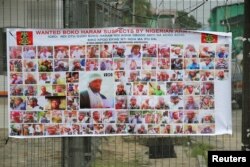Over the last six years, Boko Haram has taken suicide bombing to horrific extremes. The terror group has convinced large numbers of women and children to join its fight and sacrifice their lives to kill people in markets, schools and other public spaces across northeast Nigeria and in neighboring countries.
In response, the Nigerian government has acknowledged the need to encourage defections and deradicalize former Boko Haram members. The government says it is working with defectors at camps in the northeast, with the aim of reintegrating them into society.
But human rights groups question the effectiveness of the efforts, which they say amount to little more than indefinite detention in squalid conditions.
Programs questioned
According to a report by the Combating Terrorism Center, Boko Haram deployed 434 suicide bombers between April 2011 and June 2017. Fifty-six percent of the bombers were women, and 19 percent were children or teens.
"Boko Haram is at the forefront of normalizing the use of children as suicide bombers, especially female children and teenagers," the report said. "Boko Haram's child suicide bombers, which have tended to target markets and bus stops, have been surprisingly effective, outstripping the casualty rate of their adult counterparts."
Deradicalization programs have become a key strategy in the Nigerian government's effort to end the attacks. At the U.N. General Assembly last year, Nigerian President Muhammadu Buhari expressed confidence that the strategy was paying dividends.
"The deradicalization process is also going on, and we are achieving some measure of success. Even suicide bombing is becoming rare, as the local people are themselves rejecting indoctrination by the insurgents," Buhari said.
But, in a 2016 report, Amnesty International found that the Nigerian military was detaining large numbers of civilians in overcrowded, filthy facilities without due process or efforts to begin reintegrating them into their communities.
In a phone interview with VOA, Netsanet Belay, Amnesty International's Africa director for research and advocacy, said the situation hasn't changed since the group published its report.
"We believe that thousands of individuals who've been arbitrarily arrested [and] suspected of being either Boko Haram members or supporters — or even their families — have been detained in these military detention centers," Belay said.
Additionally, Amnesty says Nigeria is making little effort to separate captured fighters from civilians, and even children with no affiliation to the terror group are being detained.
"The conditions are horrible, and we are appalled to learn, as we have published last time, [that] even babies and children are also detained in these military detention centers," Belay said. "A few of them are born there while the mothers are in detention, but most of them are arrested alongside with their families or with their mothers."
'Appalling' conditions
Giwa barracks, near the northeastern city of Maiduguri, is one of the main detention centers. Hilary Matfess, a researcher who co-authored the CTC report on suicide bombing, said that the government recently opened a deradicalization center in Gombe state, but defectors and others are still held for extended periods in military detention centers.
"All of the accounts I received were that, when people attempted to defect, [they] would go through a screening process that was essentially just detention by the Nigerian military … [in] the holding area of Giwa barracks," she said. "The detention center is notoriously overcrowded. It has appalling human rights conditions, and, according to people that I spoke to, that's where a number of those who were seeking to defect were taken," Matfess told VOA.
A July report by the Nigerian newspaper Leadership found that five ex-combatants had completed a six-week training program at the Gombe state center, with 95 others trained in vocational skills such as tailoring and carpentry.
But the vast majority of those captured remain in military camps. The treatment runs counter to the goal of winning the hearts and minds of people in northeast Nigeria and encouraging more fighters to defect, Matfess said.
"It's fairly straightforward counterinsurgency practice [that] if you have people that wish to defect, you should be making it very easy for them to defect, and you should be using them as an intelligence resource. And, it is a practice that's been regarded the world over as a smart move," she said.
By encouraging more defections, Matfess said, the Nigerian government can deny Boko Haram its lifeblood: young recruits.
"It's in the government's self-interest to not only defeat the forces of this group that's wrought so much damage but to then also have the defectees be treated well so that you can use that to catalyze more people to defect," she said. "And then to have them be ... at least trusting [enough] of the government that they will provide them with information about the functioning of the insurgency."






